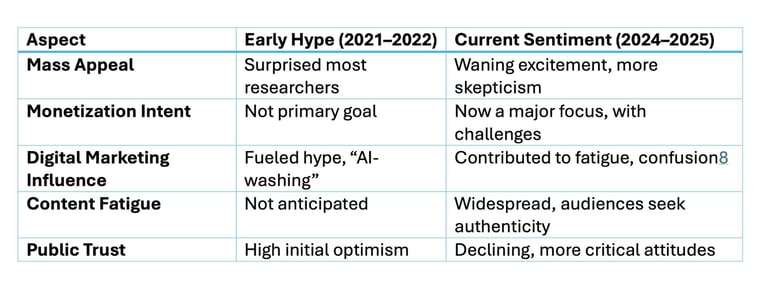Your blog post
Blog post description.
7/8/20253 min read


AI’s Mass Appeal: Was It Expected?
When generative AI models like ChatGPT captured global attention in 2021, the sheer scale of their mass appeal surprised many in the scientific community. While researchers anticipated that conversational AI could have broad applications, the speed and intensity with which these tools became cultural phenomena—used by millions for everything from coding to content creation—exceeded most early expectations. The academic and technical literature at the time focused more on technical capabilities and ethical concerns than on predicting a viral consumer craze12.
Monetization: Was It the Intention?
The primary intention of the AI science community was not direct user monetization, but rather advancing research and demonstrating new possibilities in human-computer interaction. However, as these tools gained traction, commercial interests quickly moved in. Technology companies experimented with various monetization strategies—subscriptions, pay-per-use tokens, licensing, and data-driven services—often learning through trial and error as they sought sustainable business models345. The original models were not designed for direct transactions or advertising, and retrofitting them for monetization presented challenges, especially around trust and user experience5.
The Role of Digital Marketing Gurus
Digital marketing professionals played a significant role in amplifying the AI hype. The promise of hyper-personalization, automation, and predictive analytics drove a surge in AI-branded marketing tools. Many vendors rebranded existing products as “AI-powered,” fueling inflated expectations and a sense of urgency among business leaders not to be left behind. This “AI-washing” contributed to both the buzz and the confusion in the marketplace678.
Content Fatigue: Is AI Wearing Out Its Welcome?
As AI-generated content flooded social media, blogs, and news feeds, signs of audience fatigue began to emerge. The ease of producing polished, but often generic, content led to a glut of similar-sounding articles, posts, and videos. Audiences increasingly reported that such content lacked originality and authenticity, making it harder for unique voices to stand out. Many users now actively seek out more human, authentic perspectives—such as interviews and podcasts—to escape the monotony of AI-generated material91011.
Fading Popularity and Growing Skepticism
There is clear evidence that the initial excitement around AI is giving way to skepticism and even annoyance for some. Surveys show that public optimism about AI has declined since the early days of the ChatGPT boom, with more people expressing concerns about risks, privacy, and the societal impact of AI. Trust in AI companies has dropped significantly, and the term “AI” is increasingly used with negative connotations, akin to “artificial flavoring” or “insincere creativity.” This shift is driven by overexposure, unmet expectations, and the realization that AI-generated content often feels sterile and disconnected from genuine human experience121314.
Summary Table: The Arc of AI’s Popularity
Key Takeaways
The AI science community did not fully anticipate the viral, mass-market appeal of generative AI tools.
Monetization was not the original intent, but quickly became a central concern as commercial adoption soared.
Digital marketing amplified both the hype and the confusion, sometimes overstating AI’s capabilities.
AI-generated content has led to audience fatigue and a renewed appreciation for authentic, human-created material.
Public sentiment is shifting from wonder to skepticism, with trust in AI companies and technologies declining.
References
https://www.sciencedirect.com/science/article/pii/S0268401223000233
https://hai-production.s3.amazonaws.com/files/hai_ai_index_report_2025.pdf
https://www.exchangewire.com/blog/2025/06/16/the-ai-monetisation-dilemma-beyond-keywords-and-clicks/
https://agilityads.com/blog/ai-in-marketing-hype-vs-reality-for-cmos
https://www.proweaver.com/ai-in-digital-marketing-a-game-changer-or-hype
https://www.ey.com/en_ch/insights/ai/ai-generated-content-challenges-and-opportunities
https://www.ey.com/en_ch/insights/ai/is-ai-content-fatigue-setting-in
https://www.baldurbjarnason.com/2024/the-mainstreaming-of-ai-scepticism/
https://www.sciencedirect.com/science/article/pii/S0268401224000318
https://www.cjr.org/tow_center_reports/artificial-intelligence-in-the-news.php/
https://www.pewresearch.org/internet/2021/06/16/1-worries-about-developments-in-ai/
https://publikationen.bibliothek.kit.edu/1000176001/155426244
https://fivethirtyeight.com/features/chatgpt-thinks-americans-are-excited-about-ai-most-are-not/


